Success Story 1 – Shri Chunwad Singh
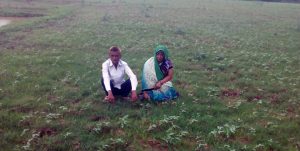 Shri Chunwad Singh S/o Shri Shyam Singh is a farmer of Village Kailashpur, situated 11 kms away from the Krishi Vigyan Kendra (KVK) on the Satna Chitrakoot Road. Sri Chunwad Singh resides with 11 family members and owns 15 ha of land. The land is undulated, sloping, with loose texture and low fertility. It is irrigated through a pond. Initially, he followed a single cropping system i.e. fallow-gram (8 ha), Arhar+Jowar (1 ha), fallow – wheat (0.5ha) and cultivable fallow – 5.5 ha. After the start of Deendayal Research Institute’s Lab to Land Programme through its KVK in 1994-95, his village through a bench mark survey. He was selected as a resource poor small farmer with an annual income of Rs. 32,650.00 per annum. Wilt resistant variety of gram, Awrodhi was demonstrated on 0.2 ha of his land with a full package of practices. The crop was sown in mid-October and was very vigorous with good fruiting pattern without any wilting symptom. The yield of the demonstrational plot was bumper i.e. 22.50 q/ha against local check 15 q/ha. It was beyond expectation.
Shri Chunwad Singh S/o Shri Shyam Singh is a farmer of Village Kailashpur, situated 11 kms away from the Krishi Vigyan Kendra (KVK) on the Satna Chitrakoot Road. Sri Chunwad Singh resides with 11 family members and owns 15 ha of land. The land is undulated, sloping, with loose texture and low fertility. It is irrigated through a pond. Initially, he followed a single cropping system i.e. fallow-gram (8 ha), Arhar+Jowar (1 ha), fallow – wheat (0.5ha) and cultivable fallow – 5.5 ha. After the start of Deendayal Research Institute’s Lab to Land Programme through its KVK in 1994-95, his village through a bench mark survey. He was selected as a resource poor small farmer with an annual income of Rs. 32,650.00 per annum. Wilt resistant variety of gram, Awrodhi was demonstrated on 0.2 ha of his land with a full package of practices. The crop was sown in mid-October and was very vigorous with good fruiting pattern without any wilting symptom. The yield of the demonstrational plot was bumper i.e. 22.50 q/ha against local check 15 q/ha. It was beyond expectation.
The next year, he extended the area of gram to 1.2 ha and harvested a very good yield (37 q) by confidently adopting almost all the package of practices that he had done earlier under the supervision of the Institute’s scientists. He also sold 40 kg seed to his neighbour and sold the rest in market. In the third year, he planted 8 ha land with gram of variety Awrodhi and stopped using his earlier seed. Simultaneously, he replaced all the old varieties of Arhar, Wheat, Jowar and Paddy through improved varieties and converted 13 ha land area under irrigation and double cropping i.e. Paddy-Wheat (Govind/IR-36, WH-147), Paddy-Gram (Awarodhi), Paddy-Mustard (Varuna, JM-1), Fallow-Gram/Mustard and Arhar+Jowar (Bahar, Hyb.) Mr. Singh was in constant contact with the scientists and took technical guidance by participating in activities organized by theInstitute at the KVK centre and in his village.
During this short period he has been purchased a tractor, 2 motor pumps and a diesel engine for farm mechanization, and one motorcycle. Due to his creative, progressive and hard working nature, he is also cultivating about 15 ha land of his Panchayat’s (community land) on contract basis and earning an additional worth Rs. 70,000-80,000/- per year.
Last year, he produced 150 q gram, 60 q paddy, 185 q mustard and 170 q wheat and earned money Rs. 2,75,000.00. He generates employment for 3 other landless persons round the year with his family members.
Success Story 2 – Shri Rajender Singh
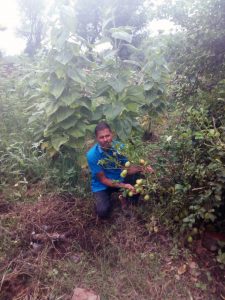 Shri Rajender Singh of Village Degarahat in Majhgawan Tehsil is a 34 year old farmer with 9 family members, and three acre of land. Despite of having a well – a perennial source of water, he was finding it difficult to earn enough to feed his family well. During the Participatory Rural Appraisal (PRA) survey conducted by Deendayal Research Institute in 1999, it was observed that the farmer was quite frustrated and worried about his poor family condition. He was advised to purchase a diesel pump for irrigation by taking loan from SBI. He purchased the Diesel pump. The Institute’s KVK in Majhgawan, chose the village to conducting a front line demonstration on ‘improved crop technology’.
Shri Rajender Singh of Village Degarahat in Majhgawan Tehsil is a 34 year old farmer with 9 family members, and three acre of land. Despite of having a well – a perennial source of water, he was finding it difficult to earn enough to feed his family well. During the Participatory Rural Appraisal (PRA) survey conducted by Deendayal Research Institute in 1999, it was observed that the farmer was quite frustrated and worried about his poor family condition. He was advised to purchase a diesel pump for irrigation by taking loan from SBI. He purchased the Diesel pump. The Institute’s KVK in Majhgawan, chose the village to conducting a front line demonstration on ‘improved crop technology’.
The farmer attended the training programme on vegetable and spices cultivation. Thereafter the farmer’s field was selected for conducting front line demonstration on tomato. The seedlings of an improved variety of tomato were supplied to the farmer. The farmer was advised to plant tomato in a 1000 sq. meter plot of land. From time to time, KVK scientists visited his field to check the crop. The farmer harvested a good crop. To sell the tomatoes, the farmer was advised to contact a residential school, and to sell the rest door-to-door in residential areas. He sold 30 quintals of tomato. He went with the advice of scientist and earned Rs. 9000/- from a small piece of land. This enhanced the level of decision-making, confidence, sense of pride and feeling of achievement in the farmer. The next year, he extended the area to one acre. The KVK made an annual plan for vegetable cultivation for the him. He was also asked to participate in all the training programmes on vegetable and spices cultivation. He was advised to grow bottle gourd, bitter gourd, cucumber, okra and cowpea during summer; tomato, brinjal, okra and cowpea during the kharif season; and tomato, pea, cabbage and garlic during the rabi season. The farmer followed the advice of the scientist and in the year 2001, his crop was produced under the proper guidance and supervision of KVK scientists. The farmer earned Rs. 42,000.00 in the end of season.
According to him vegetable and spices cultivation proved a highly profitable farming for him and KVK gave a new life to his family as it brought prosperity to his family.
Success Story 3 – Shri Devraj Singh
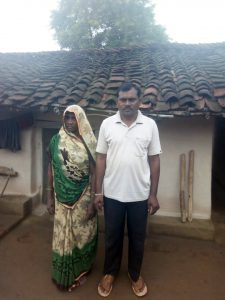 Shri Devraj Singh S/o Shri Shiv Pd. Singh of Village Bhargawan is a young man of 26, with 4 members family and 0.75 acre of land. Due to the small landholding and no irrigation facility, he found it difficult to fulfill the basic needs of his family. Under Deendayal Research Institute’s Self Reliance Campaign, he was identified as unemployed rural youth. He was advised by scientists from the Institute to start mushroom cultivation as an enterprise, as it requires little in term of land resources and money. The farmer was given a 3 day training at the Institute’s KVK in Majhgawan on mushroom cultivation. After completing the training, the farmer was provided spawn and other essential materials to start the enterprise. He started mushroom cultivation in a 15 x 15 sq. ft. hut with 50 beds. He harvested 75 kg of mushroom as a first crop. He harvested 4 crops from November to March and earned Rs. 10,000 by selling it @ Rs. 40/Kg.
Shri Devraj Singh S/o Shri Shiv Pd. Singh of Village Bhargawan is a young man of 26, with 4 members family and 0.75 acre of land. Due to the small landholding and no irrigation facility, he found it difficult to fulfill the basic needs of his family. Under Deendayal Research Institute’s Self Reliance Campaign, he was identified as unemployed rural youth. He was advised by scientists from the Institute to start mushroom cultivation as an enterprise, as it requires little in term of land resources and money. The farmer was given a 3 day training at the Institute’s KVK in Majhgawan on mushroom cultivation. After completing the training, the farmer was provided spawn and other essential materials to start the enterprise. He started mushroom cultivation in a 15 x 15 sq. ft. hut with 50 beds. He harvested 75 kg of mushroom as a first crop. He harvested 4 crops from November to March and earned Rs. 10,000 by selling it @ Rs. 40/Kg.
This enhanced the faith and the confident of the farmer, and today 10 landless farmers in the village have taken mushroom cultivation as a source of income.
Success Story 4 – Shri Rewati Raman Tripathi
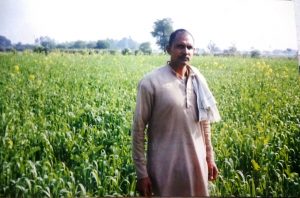
Shri Rewati Raman Tripathi S/o Shri Anusuiya Prasad Tripathi is a progressive farmer of Lodhwara village, District Chitrakoot at a distance of 5 km. from the district headquarters and 23 km. from the Deendayal Research Institute’s Krishi Vigyan Kendra at Ganivan. He was using old varieties of paddy, wheat, gram and lentil. After attending a kisan gosthi, he came to the KVK to purchase latest varieties of seed. He met to Dr. Chhotey Singh, Training Organizer and learnt about the KVK. After meeting with the T.O. he joined the training programmes and cultivated his crops according to their advice. He tried the 2.5 acre model developed by Deendayal Research Institute for small and marginal farmers. Through the model, he raised his gross farm income from Rs. 27,580/- to Rs. 41,810/- in the year 2001-02. Earlier he left his land fallow during the kharif and zaid seasons, but now, with his new knowledge, he is not only growing latest variety of cereals but also spices and vegetables along with plantation of fruit trees like papaya, guava, aonla, pomegranate and lemon through the year. He also did top working on wild ber trees.
It is the matter of pride for the Institute that Sri Rewati Raman Tripathi obtained 1st position in the district in hybrid rice production (72 Q./ha.) given by the State Agriculture Department for the year 2001-02. He also got a prize in an Agro quiz organized in Agro Expo 2002 at Lucknow, showing his ability of adopting new technologies. He is now a very important resource person of for the KVK and he motivating other villagers also for the adoption of new technologies and process.
Success Story 5 – Shri Daya Shankar
Chak Gaura is a hamlet of Kuin village. It is situated 15 km away from the District headquarter Karwi and 3 km away from Deendayal Research Institute’s Tulsi Krishi Vigyan Kendra, situated at Ganivan (U.P.). The total population of the village is 1508. 49.60% of the population are scheduled caste. There are a total of 678 animals, which include 228 cattle and 113 buffalo. This village is also a Self Reliance Center of the Institute. While the Institute’s team, including some KVK scientists was in the village for the self reliance campaign, Mr. Daya Shankar a biology graduate, came into contact with the team. He asked about employment opportunities. He was informed that he could join any of the income generating training programmes conducted by the Institute like Para Veterinary, Gardener’s Training, Diesel engine mechanic, etc. After discussions with the team, he joined a Para Veterinary course in January 2003 and completed it by April 2003. Training was important for identification and control of different diseases of animal, vaccination and parasitology. Immediately after the completion of his training, he started practicing. Due to his sincerity, he became popular in nearby villages. The lack of a Veterinary Doctor and Animal Hospital in the periphery made his profession more profitable. Within two months, he earned Rs. 4,000/- through which he paid his admission fee for a post graduation programme. His future plan is to open animal health clinic in his village. He has set and example for unemployed rural youth. His success made many youth join veterinary training course organized by the Institute for self- employment.
Success Story 6 – Smt Sharyania
Smt. Sharvania, a landless agricultural farmer 31 years old who was finding it difficult feed her family 5 years ago, is now living a happy and prosperous life with her husband, 3 daughters and one son. Sharvania had never thought women like her could become the owner of a tractor. She says that she has never dreamed about it.
She narrates her story: “My husband was not able to feed the family well. Sometimes my children used to go to their beds hungry. I do not want to recall those miserable days. Forget about meals twice a day, my family hardly got a single meal. Both my husband and I used to work in a landlord’s field from dawn to dusk, for Rs. 20/- per day. In the meantime, 2 women visited our village Pindra, to organize a camp on child vaccination. One of them was from Deendayal Research Institute and the other from the State Medical Department. I was not getting any work those days. I asked them to give me some job in their home as a housemaid. The scientist asked me to come to the Institute’s KVK. At that time, a 20 days training programme on nursery management and establishment was being held. I was asked to join this training programme. I joined it. At the end, each trainees was given Rs. 600/- + 1kg Polythene bag and some seeds of Aonla, Custard Apple and Eucalyptus to practice it at our homestead. I put the seed in nursery and polythene bag as per the imparted training. Next year, I sold the plants for Rs. 2,000/-. It gave me a good boost to take this enterprise as a means of our livelihood. I was given Rs. 3,000/- as financial assistance by Nanaji Deshmukh. I hired an 800 sq. m. piece of land in Pindra on lease basis for Rs. 1,000/- in 1998. I procured the seed from the KVK and started a nursery. From time to time, KVK scientists gave their guidance for successful growing the plants. The next year, I sold 10,000 plants for Rs. 28,000/-. In the year 2000, I sold 15,000 plants for Rs. 46,000/-. Again in 2001, I grew 15,000 plants, but could not sell them all. I could only earn Rs. 38,000/-. By 2002, I again grew 15,000. With the balance left from the year before, I sold 20,000 plants for Rs. 71,625/-. I purchased a tractor with a loan this year by depositing the initial instalment of Rs. 30,000/-. I also hired 15 acres more on lease to increase my production.” In conclusion, she says, “If women do not lose heart and work hard, they can come up with flying colours of success.”
Success Story 7 – Smt. Badrunissa Begum
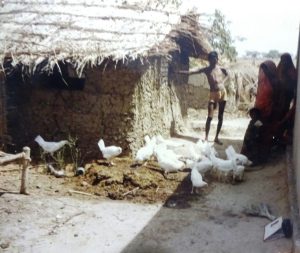
This is the story of Smt. Badrunissa Begum living in Buda Semarwar. The village is situated at the 12 km marker on the Karwi Rajapur road. The family was facing an economical crisis due to their irregular income from the sale of condensed milk (Khoya). One day she came into contact with Deendayal Research Institute’s home scientists, attached to the KVK, who were in the village for a training programme. She asked for guidance and was told about the various enterprises for self employment and generating extra income. Since she already had a little knowledge of poultry farming, she joined a vocational training programme on poultry farming at the KVK. After completing the course, she constructed a poultry shed (10’x 4’x2.5’) in her backyard with the help of the Institute. In January 1999, 20 layers of Bebcock breed were supplied to her by the KVK to start her poultry unit. After 4 months, she started earning of Rs. 25-30/- per day by egg selling. In her first year, she acquired another 40 birds and sold the 20 old birds. She earned Rs. 1,200/- by selling 6 cocks @ Rs. 60/- in the festive season. At present she is earning additional income of Rs. 8,000 to 9,000/- per annum. Hopefully, she will earn more money in the future set an example for other rural women.
